Index relies entirely on the support of donors and readers to do its work.
Help us keep amplifying censored voices today.
The events of the last week have been horrific. We won’t rehash them here — the videos, photos and details coming out of the Middle East are everywhere you look. For an organisation that campaigns for free speech, we have struggled to find words to respond to the mounting loss of life and the horrendous accounts that emerge every day. But at Index our job is not to report on all of this. Instead our job is to uphold free expression, and to alert the world to the instances where this has been curtailed. So that’s what we’ll do. Here are the free speech issues we are most concerned about:
Killed and missing journalists
Amid the deaths of civilians, journalists are losing their lives. While there’s nothing to suggest that the journalists are being specifically targeted, their lack of protection is of huge concern, both for them and for the knock-on effect for media freedom more broadly. The Committee to Protect Journalists has reported that at least 10 journalists have been killed so far. The first was Yaniv Zohar, an Israeli photographer working for the Israeli Hebrew-language daily newspaper Israel Hayom, who was killed alongside his wife and two daughters during the Hamas attack on Kibbutz Nahal Oz in southern Israel on 7 October. Israel Hayom’s editor-in-chief has said that Yaniv was working that day. Nine Palestinian journalists have also been confirmed dead as of yesterday and one Israeli journalist is reported missing.
Protest bans
Across the world, buildings are being lit up with blue and white, while green, white, black and red flags are being held aloft in protest. While these vigils and protests are being enacted, so too are calls to shut them down. In the UK, home secretary Suella Braverman suggested waving Palestinian flags might be a criminal act (depending on the context) and told police chiefs to be on “alert and ready to respond to any potential offences”. In France, the interior minister yesterday announced a systematic ban on pro-Palestinian demonstrations. Police have also warned against pro-Palestine rallies in Sydney, after some people chanted antisemitic slogans at a previous demonstration. The Sydney event organisers have distanced themselves from those people and said: “This behaviour has no place at these rallies.” Meanwhile, police in Sydney placed restrictions on Jewish people by warning them to stay at home while that first rally went ahead, and even arrested a man who was carrying an Israeli flag for “breach of the peace”.
There are certain areas that fall into “grey free speech” areas. Protest is usually not one of them. Only sometimes it is. The office was divided, for example, on whether there should be restrictions on protest outside abortion clinics. Today we are similarly divided. The Times argues here that some protests are making the leap from a peaceful right to expression to hate crimes. The Daily Beast argues the opposite and that these bans would erode our free speech rights.
Internet interruptions
This week we’ve heard reports of social media accounts being suspended or blocked. NetBlocks, a former Index award-winner which maps media freedom, has also reported on declining internet connectivity in areas of both Israel and Palestine, after attacks and counter-attacks. In Gaza, a total blackout is anticipated if further internet infrastructure is damaged, making access to social media all but impossible before the apps are even opened. As we reported when Erdogan cut off access to social media following the Turkey earthquakes, access to the internet and these platforms is crucial during times of disaster and war. It can be a lifeline, connecting people to aid as well as to their loved ones.
Misinformation multiplied
On Wednesday, Bellingcat founder Eliot Higgins called out a video seemingly from the BBC being circulated by Russian social media users, which claimed Ukraine was smuggling weapons to Hamas. The video was entirely fake. Others have highlighted video after video claiming to be footage of Israel bombing Gaza or Hamas airstrikes on Israel, which are in fact a combination of Assad airstrikes in Syria, fireworks in Algeria and even video game footage. Both faked and reappropriated content are running rampant on X (formerly Twitter), which is not necessarily anything new. But a Wired report suggests that the scale of the problem is new. Boosted posts from premium subscribers take precedence over once-verified news providers and hordes of fired misinformation researchers now spend their time updating their CVs rather than fighting fake news on the platform. And in an added twist fake news to smear both Muslims and Jews is also running rampant behind China’s Great Firewall on Sina Weibo.
Fair journalism
Getting news from on the ground is a huge challenge in this conflict, and it’s in that vacuum that the kind of misinformation we just outlined takes hold. So it’s all the more concerning that Israel’s public broadcaster Kan News reported that the Israeli cabinet is planning emergency legislation to ban Al Jazeera, which does have a presence on the ground in Gaza. This is not the first time Israel has announced a ban on the network. Back in 2017 Israel looked set to join a boycott by Jordan, Egypt, the United Arab Emirates and Saudi Arabia, which all accused the network of sponsoring terrorism. Relationships between Al Jazeera and Israel have also been very strained since the May 2022 killing of Al Jazeera correspondent Shireen Abu Akleh. But if Al Jazeera is banned, one of the few media outlets reporting from within Gaza will go silent.
We know that conflicts can deal a blow to free expression. At Index we are here to ensure that doesn’t happen, or at least if it does happen that it doesn’t go unnoticed. We will continue to monitor the situation closely.
When the most distinguished former chair of Israel’s Supreme Court, the 86-year-old Holocaust survivor Aharon Barak, said that he would go before a “firing squad” if it would help prevent what he sees as an existential threat to his country’s democracy, it’s a safe bet he was talking about something momentous.
Barak’s January denunciation of the attempt by Benjamin Netanyahu’s new government to neuter the Court was just part of what has brought many tens of thousands of Israeli citizens out in unprecedented protests across the country. An impressive array of judicial, political, ex-military and intelligence leaders have warned that Netanyahu’s programme is leading Israel on a path akin to that of authoritarian governments like Hungary and Poland at best, and dictatorship and “fascism” at worst.
The coalition formed on 29 December is easily the most right wing in Israel’s history and includes in key Cabinet posts two religious and avowedly extreme and anti-Arab supremacists, Bezalal Smotrich and Itamar Ben Gvir, both determined that Israel should annex the occupied West Bank. Their appointment adds a volatile new element to a conflict in which 14 Israelis and 70 Palestinians have been killed this year alone.
But it is the “reforms” to the Supreme Court drawn up by Netanyahu’s justice minister Yariv Levin which, opposed by an Israeli majority in opinion polls, have unleashed a wave of outrage on the streets. These include clauses heavily curbing judicial review, removing the criterion of “reasonableness” by which it can judge government decisions, for appointments of the Court to fall under the direct control of the government, and for judgements ruling that a government decision in unlawful or conflicts with semi-constitutional Basic Laws to be overruled by a simple majority in the Knesset (parliament).
The Court is hardly the “overmighty” bastion of liberalism depicted by its critics. Last year, for example, it approved the planned eviction of 1000 southern West Bank Palestinians from their homes purportedly to make way for an Israeli military firing zone. But it remains the last hope for individuals, Jewish or Arab, fighting against unjust decisions, whether legal or administrative. What’s more in Israel’s single parliamentary chamber system the Court is the only check and balance on the executive and the Knesset majority it invariably commands.
The changes to the Court should not be seen in isolation from other measures planned or already in various stages of enactment or proposal. These include allowing the death penalty – unused since the Nazi war criminal Adolf Eichmann’s execution in 1962 – for Palestinian terrorists, and the power to deprive Arab—though not Jewish—terrorists of residency as well as citizenship. Fears of secular Israelis have been fuelled by calls from ultra-orthodox parties for an end to the ban on segregation of men and women at publicly funded events, while Smotrich has even called for the banning of Arab political parties, representing nearly 20% of the Israeli population. Already under way is a bill to curb the law officers’ power to declare the prime minister unfit to rule. Many Israelis also see the wider judicial reforms partly as an attempt by Netanyahu to escape the possible consequences of his ongoing trial on three corruption charges.
The Netanyahu coalition agreement provides for prohibitively high taxation of Israeli civil-society organisations, several defending Palestinian human rights, which draw funding from mainly European governments, including Britain’s. The measure will not mostly apply to the many right-wing, pro-government advocacy groups because they are mainly funded by rich individuals, especially in the USA.
There has not yet been any legislative attack on Israel’s still fairly vibrant press, albeit in a market dominated by the pro-Netanyahu freesheet Israel Hayom. But writing after the election last October Aluf Benn, editor of the liberal newspaper Haaretz, pointed out that existing legislation for ordering a state of emergency lays down powers for a press clampdown, and suggested that Netanyahu, Smotrich and Ben Gvir wanted a state “in which criticising the government or replacing it will only be a pipe dream.”
In a sense, however, the changes to the Supreme Court are the programme’s hinge, by severely weakening its right to strike down any of these or other measures because, say, they do not conform with the 1992 Basic Law on Human Dignity and Liberty. Indeed if so far vain attempts by Israel’s President Isaac Herzog fail to secure a compromise on the changes, and the government passes the Court legislation by the end of March as it intends, a major stand-off between it and the Court is in prospect, leaving much of Israel—perhaps even including senior Army figures—having to choose between its recognition of an elected government and its respect for the law as it has prevailed since the state’s foundation 75 years ago.
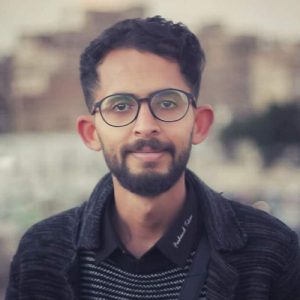 Yemeni artist Thiyazen Al-Alawi uses his craft to shed light on the destructive situation in Yemen through street art campaigns. He hopes to inform the public of what the war has done to his homeland.
Yemeni artist Thiyazen Al-Alawi uses his craft to shed light on the destructive situation in Yemen through street art campaigns. He hopes to inform the public of what the war has done to his homeland.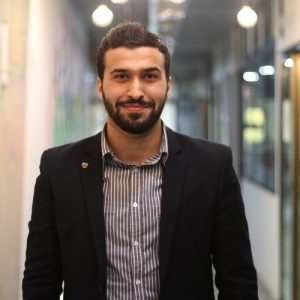 Moe Moussa is a journalist, podcaster, poet, and the founder of the Gaza Poet Society. He uses various forums and mediums to amplify the voices of Palestinians.
Moe Moussa is a journalist, podcaster, poet, and the founder of the Gaza Poet Society. He uses various forums and mediums to amplify the voices of Palestinians.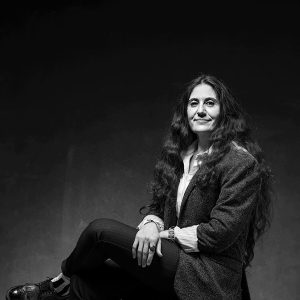 Fatoş İrwen is a Kurdish artist and teacher from Diyarbakır, Turkey working with a variety of materials and techniques.
Fatoş İrwen is a Kurdish artist and teacher from Diyarbakır, Turkey working with a variety of materials and techniques.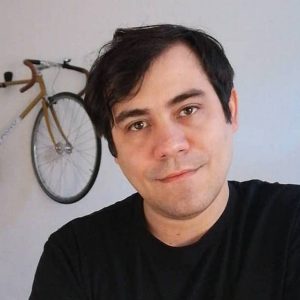 Hamlet Lavastida has been described as a political activist by way of art. Lavastida uses his art to document human rights abuses in Cuba and to criticise Cuban authorities.
Hamlet Lavastida has been described as a political activist by way of art. Lavastida uses his art to document human rights abuses in Cuba and to criticise Cuban authorities.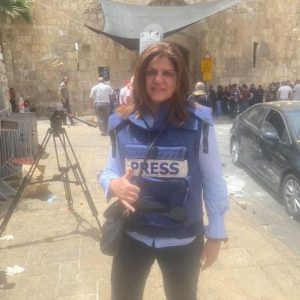
Al Jazeera journalist Shireen Abu Akleh
This week I was planning to write about the Queen’s speech, delivered this week by HRH Prince Charles, as the British Parliament began its new parliamentary session and the Government outlined it parliamentary priorities. There are now six proposed pieces of legislation by the British Government that will impact our collective rights to both freedom of expression and privacy in the United Kingdom. But my views on the ideological incoherence of the Government’s approach to freedom of expression will have to wait until next week.
Because today we mourn the death of another journalist. On Wednesday, Shireen Abu Akleh, a well-known and well regarded Palestinian-American journalist was killed while doing her job in Jenin.
According to Committee for the Protection of Journalists (CPJ) Shireen is the 17th journalist to have been killed in the line of duty in 2022. Index has fought to defend the rights of journalists for over fifty years. Every attack on a journalist is an effort to stop people speaking truth to power. It’s an attempt to quash dissent and to impose a single world view. And every death seeks to silence not just the voice of journalists but through them the voices of all of us. We cannot allow those who seek to repress their populations to win.
Today our thoughts and prayers are with Shireen’s family and loved ones. And as much as we mourn her today, we remember and honour the work and sacrifices made by her, her family and the sixteen other journalists who have lost their lives in 2022.
6 January – John Wesley Amady, Haiti
6 January – Wilguens Louis-Saint, Haiti
9 January – Pu Tuidim, Myanmar
17 January – Alfonso Margarito Martinez Esquivel, Mexico
5 February – Rohit Biswal, India
9 February – Evariste Djailoramdji, Chad
10 February – Heber Lopez Vasquez, Mexico
23 February – Maximilien Lazard, Haiti
1 March – Yevhenii Sakun, Ukraine
13 March – Brent Renaud, Ukraine
13 March-1 April – Maks Levin, Ukraine
14 March – Oleksandra Kuvshynova, Ukraine
14 March – Pierre Zakrzewski, Ukraine
15 March – Armando Linares Lopez, Mexico
23 March – Oksana Baulina, Ukraine
Late March – 2 April – Mantas Kvedaravicius, Ukraine
11 May – Shireen Abu Akleh, Occupied Palestinian Territory
Each of these brave journalists needs to be remembered and celebrated for their work and their sacrifice. And their families need and deserve both the truth and, most importantly, justice.